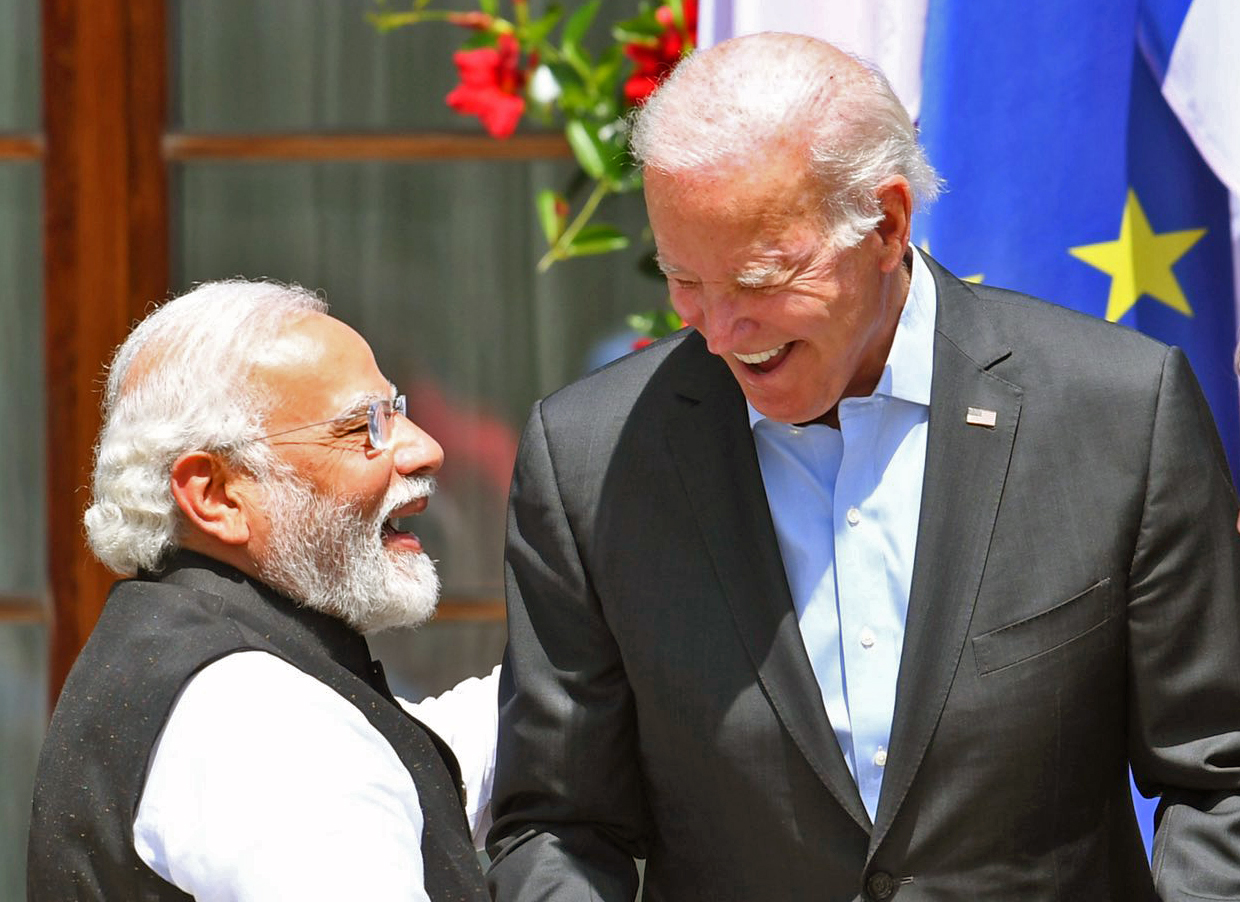Modi’s maiden state visit to the United States are inescapable as the White House gears up to serenade the Indian leader. In an unprecedented build-up, the White House, the State Department and the Pentagon are rhapsodising in unison about the Modi visit in anticipation. Key members of the Biden cabinet and politicians across the aisle have literally exhausted adjectives and hyperboles, branding the forthcoming visit by PM Modi as “transformative, historic, pathbreaking.”
The ceremonial part of the visit—with all the bells and whistles—will be captivating and breathtaking. PM Modi will be welcomed at the White House on the morning of 22 June with a 21-gun salute, with a record number of Indian-Americans in attendance. The Biden administration has pulled out all stops to make the Modi visit memorable and substantive in terms of optics as well as outcomes. PM Modi will be only the third state visitor of the Biden administration, after French President Emmanuel Macron in December 2022 and South Korean President Yoon Suk Yeol in April 2023. Modi will also become the first Indian leader to address the joint session of the US Congress on 22 June, for the second time.
With so much hype and frenzy, the big question is whether the 20-23 June visit by PM Modi to the US will live up to grand expectations. Sceptics may scoff and cynics may cavil, but if one looks at the sheer ambition and breadth of the agenda, this is one of those rare occasions where the results may actually surpass the hype. The deliverables that will be unveiled after the talks between PM Modi and US President Joe Biden at the White House on 22 June, will be truly transformational and revolutionary in its long-term impact and ramifications.
NEW ENGINE,
NEW JOURNEY
The centrepiece of PM Modi’s visit to the US will be a pathbreaking agreement between General Electric and Hindustan Aeronautics Ltd (HAL) to co-manufacture jet engines in India. Co-manufacturing of GE F414 jets, which will be used to power future fighter jets such as the Tejas Mark 2, promises to be a game-changer for India’s quest to indigenize its defence-industrial complex.
The long-term impact of the jet engine deal will be the acceleration of the removal of technology-related barriers. In a sign of things to come, President Biden is driving the deal from the front, instructing officials to remove unnecessary obstacles and barriers to deepen defence, trade and technology cooperation with India. The transfer of technology that is likely to occur will have multiple ripple effects on the country’s domestic defence industry, buttressing India’s capacity to not only manufacture weapons for domestic needs, but also enhance its capacity to export to friendly countries of the Global South. Strategically, the jet engine deal will bolster India’s deterrence against Chinese aggression and accelerate the rise of India as a major Asian and global power.
Defence ties are poised for exponential growth, with Defence Minister Rajnath Singh-led Defence Acquisition Council (DAC) approving a deal to acquire 31 weaponised MQ-9 Reaper drones—15 for the Navy and eight each for the Army and the Air Force. The drone deal is expected to strengthen India’s defence against China in the Indian Ocean Region, along its land borders, especially with regard to China providing Pakistan with armed Cai Hong-4 and Wing Loong-II drones. These drones can also be used to strengthen monitoring of Chinese military activities along the Line of Actual Control and the long-standing confrontation in Eastern Ladakh.
DEFENCE INNOVATION BRIDGE
The big takeaway of PM Modi’s visit to the US will be the removal of barriers and regulations to facilitate India’s emergence as a fulcrum of global technology supply chains. Ahead of the Modi visit, the two-day
ROAD AHEAD:
NEXT STEPS
China will be the elephant in the room when President Biden and PM Modi sit down for talks in the White House on 22 June. Curbing China’s aggressive posturing and rules-altering behaviour in contested geographies such as the South China Sea will figure in the discussions. From defence deals to semi-conductors, India and the US will be looking to challenge China’s ambitions. Looking ahead, the real big deal of the Modi visit will be the liberation of India from technology constraints that have hobbled the growth potential of the world’s fastest-growing major economy. The civil nuclear deal struck in the summer of 2005 was the defining moment that converted the once estranged democracies into engaged democracies, setting the stage for rapid transformation of India-US relations over the next few years. The nuclear deal enhanced India’s international stature by bringing India into the global nuclear tent, but nearly a decade and a half later, the nuclear deal is still a work in progress. This is why the summer of 2023 is the watershed moment in India-US relations, with both sides finally overcoming “hesitations of history,” in PM Modi’s famous words to the US Congress in 2016, to script the next big steps in the world’s fastest-growing strategic partnership.
Manish Chand is CEO, Centre for Global Insights India, a think tank focused on global affairs and India Writes Network. He is Editor-in-Chief, India and the World, a journal on international affairs.

